- Home
- Kate DiCamillo
Beverly, Right Here Page 2
Beverly, Right Here Read online
Page 2
“Now,” said the woman. She blinked again. She looked like a baby owl. “I wonder who you belong to.”
“What?” said Beverly.
“Who are your kin?” asked the woman.
Beverly shrugged.
“You don’t have kin?”
Beverly shrugged again.
Joe Travis Joy was kin, she supposed. And there were all the cousins on her mother’s side of the family. And her uncle.
And there was her mother, of course.
Even though Beverly didn’t really feel like she was related to her mother.
And there was her father, who had been gone since she was seven years old.
She had a dog. Or she used to have a dog.
She had friends.
Well, one friend — Raymie.
Her other friend — Louisiana — had left and was in Georgia now.
It stunk, how people left.
“I don’t have any kin,” said Beverly.
She stared at the old lady. Either her hair was crooked or she was wearing a wig.
“Everybody has kin,” said the woman in a very solemn voice.
Beverly was hungry and tired. She thought that she would like to sit down.
She felt as if she had traveled a long way.
Even though Tamaray Beach wasn’t really that far from Lister.
She wished, suddenly, that she had gone farther.
“Listen to me,” said the woman. She looked up at Beverly. Her glasses glinted in the late-afternoon light. “I think you’re hungry. Now, am I right? Are you hungry?”
“Yes,” said Beverly.
She was hungry.
The world got very quiet. There was no sound except for the ocean crashing and muttering.
It would be nice if the ocean would shut up for just a few minutes.
“You didn’t tell me your name,” said the woman.
Beverly looked down and saw that she had the name tag from Mr. C’s in her hand. She held it up like it proved something.
“What’s that?” said the woman. She leaned in closer. She squinted. “Bee-verl,” she said. “Your name is Bee-verl?”
“It’s Beverly. I just got a job.”
“Over at Mr. C’s?”
“Yes.”
“Well, good for you. Although they do fry their fish half to death over there. I’m Iola. Iola Jenkins.”
“Okay,” said Beverly.
“Let me ask you something, Bee-verl.”
“It’s Beverly.”
“I know it,” said Iola. “I’m just joshing you. Now, here is what I need to know. Can you drive a car?”
“Yes,” said Beverly.
“Well, now,” said Iola. She cleared her throat. “Here is another question. Do you enjoy playing bingo?”
“Bingo?” said Beverly.
“Never mind,” said Iola. “Don’t pay me no mind. Why don’t you come on inside, and I will make you a sandwich?”
Beverly put the name tag in the pocket of her jeans. She followed Iola up a flight of crooked wooden stairs.
In a crooked little house by a crooked little sea.
“Now, you like tuna fish, don’t you?” said Iola from up ahead of her.
What was it with people and fish?
“Sure,” said Beverly.
“Good,” said Iola. “I make the best tuna melt you will ever have in your life.”
“Oh, boy,” said Beverly. “I can’t wait.”
The thing about the Pontiac,” said Iola when Beverly was sitting across from her at the tiny little table in the tiny little kitchen, “is that I promised my children I would not drive it. I signed a piece of paper, a — thingamajig.”
“A contract?” said Beverly.
“That’s it,” said Iola.
Beverly picked up her sandwich and took a bite. It tasted like fish, but it also tasted good. Iola had toasted the bread and melted cheese on top of the tuna, and the sandwich was warm in Beverly’s hands.
For some reason, she felt like she might cry.
She took another bite.
“I signed a contract,” said Iola. “That’s exactly what I did. It was Tommy Junior who made me do it. He’s a lawyer. He had me sign it, and it says that I will not, under any circumstances, drive the Pontiac until further notice. Or some such.”
“Why?” said Beverly.
“Why what?” said Iola. She blinked. Up close, her eyes looked even bigger and owlier.
“Why did he make you sign a contract?”
“Pshaw,” said Iola. She waved a hand through the air. “It wasn’t nothing much. I mixed up the reverse and the forward is all. I ended up driving the Pontiac into Bleeker’s Insurance. I knocked a few bricks off the building — that’s all, a few bricks. But my land! You would have thought that I had knocked the whole building down the way everyone went on about it.
“You know, those insurance companies deal with catastrophes all the time, and this was not a catastrophe. No, it was not — it was a few bricks. Ten, at most. And the front of the Pontiac got crumpled up some. It still runs! It’s a wonderful car, and it still runs. But I can’t drive it because I promised I wouldn’t. Me, not driving! Why, I’ve been driving practically my whole life.”
“I’ve been driving since I was in fourth grade,” said Beverly.
“Fourth grade?” said Iola. She blinked.
“My uncle taught me. My mother was drunk all the time, and so he figured it was a good idea for me to know how to drive.”
“For heaven’s sake,” said Iola.
Beverly shrugged. “All I’m saying is that I’m a good driver.”
“The Pontiac is very large,” said Iola. “It’s a large car.”
“It doesn’t matter what size the stupid car is,” said Beverly. “I can drive it.”
When Beverly was done eating, they went outside to the carport.
The Pontiac was huge and olive-colored. Its front end was smashed in.
“Are you sure it still runs?” said Beverly.
“It runs,” said Iola. “And I tell you what. I should just get in there and start it up and drive on out of here and go to the VFW on my own. I don’t care about the contract. I don’t! I’m happy to lie to the children. They lied to me all the time, growing up.
“But here is the truth: I’m afraid. I’m afraid of my own capabilities. I mean to say that I am afraid I’ve mislocated my capabilities.” Iola sighed. “What it comes down to is that I don’t know if I trust myself anymore.”
“Give me the keys,” said Beverly.
Iola went into the trailer and came back with the keys and a big black purse. Beverly got in the driver’s seat, and Iola got in the passenger seat.
The Pontiac started right up.
Beverly backed it out of the carport.
“Well,” said Iola, “you’re good at backing up.”
“I’m good at going forward, too,” said Beverly. She put the Pontiac in drive, and they went down the little seashell road of the trailer park and out onto A1A.
Beverly smiled. She looked over at Iola. She was smiling, too. Her black purse was balanced in her lap.
Beverly went faster.
“Oh, my,” said Iola. She put both hands on top of her purse. “Now, you have a driver’s license, don’t you?”
“Sure,” said Beverly. She was only a year away from her learner’s permit — less than a year, really. A learner’s permit was a license, wasn’t it?
She put her foot down on the gas. They went faster still.
This was what Beverly wanted — what she always wanted. To get away. To get away as fast as she could. To stay away.
Oh, I have slipped the surly bonds.
That was a line from a poem they had memorized in school.
Beverly didn’t think the poem was that great, but she loved the words about the surly bonds, about slipping them. Those words made sense to her.
Iola cleared her throat. Beverly thought that she was going to tell her to slow down.
Instead Iola said, “Who do you belong to, child?”
“No one,” said Beverly.
“Well, I don’t believe that,” said Iola.
“It’s true,” said Beverly.
“Where are you living?”
“None of your business,” said Beverly.
But where was she living? She hadn’t thought about that at all.
“When you get as old as me,” said Iola, “everything is your business. How about I make you a deal?”
“I don’t want to make a deal,” said Beverly.
“The deal is you can stay with me. You can drive me to bingo at the VFW. And to the grocery store. We can help each other out until you’re ready to go back to where you belong.”
“You don’t even know me,” said Beverly.
“I do not,” said Iola.
“I could be a criminal.”
“Are you?” said Iola.
Beverly shrugged.
“My husband always did say that I was a fool for trusting people. He said, ‘Iola, you would trust the devil to sell you a pair of dancing shoes.’”
“Why would the devil be selling shoes?” said Beverly.
“The devil gets up to all sorts of nonsense,” said Iola. “That’s why he’s the devil. But still — people got to go on their instincts sometimes, don’t they? We got to trust each other in the end. Don’t you think?”
Beverly could think of all kinds of reasons not to trust.
People leave — that was one of the reasons.
People pretend to care, but they don’t, really — that was another one.
Dogs die, and your friends help you to put them in the ground.
That was a big one, right there.
“You can stay with me,” said Iola. She reached over and patted Beverly’s arm. “We will help each other out. We’ll trust each other.”
They stopped and got chocolate milkshakes at a place called Sandcastle Sweets, and when they came back to the Seahorse Court, it was dusk and a purple gloom was settling over everything.
Iola gave Beverly a nightgown to sleep in — one with pink flowers and lace at the collar.
Beverly thought that she would rather die than put it on.
And then she put it on.
She was making all kinds of questionable decisions: working at a fish restaurant, eating tuna melts, wearing flowered nightgowns.
“Do you know how to play gin rummy?” said Iola.
“Sure,” said Beverly.
They went out to the small porch at the back of the trailer. There was a wicker couch out there, and a wicker chair and a little glass table.
Iola put a bowl of peanuts on the table, and then she dealt the cards.
“Don’t hold back just because I’m an old woman and can’t stand the thought of losing,” she said.
“Why would I hold back?” said Beverly.
It was full dark outside.
A streetlight clicked on, and the little porch became a yellow island.
Beverly thought, I have left home to wear a flowered nightgown and sit on a little tiny porch in a trailer park and play cards with an old lady. This is stupid.
But where she had been had never truly felt like home.
Still, it was where Buddy was buried — out underneath the orange trees in the backyard. Beverly had dug the grave herself, crying the whole time and promising herself that once she stopped crying, she would never start again.
Putting dirt on top of his body — covering him up, sending him away without her — was the hardest thing she had ever done.
Raymie had come over to the house and stood with her in the backyard. She put dirt on top of Buddy’s body, too.
“Buddy,” Raymie kept saying. “Buddy, Buddy.” She was crying. “How are we going to survive without him?” she asked. “He was the Dog of Our Hearts. That’s what Louisiana always called him. Remember? How are we going to live without him?”
Beverly didn’t know. She felt mad at Raymie for even asking the question.
“We should say some poetry,” Raymie had said when they were done covering Buddy up.
Poetry seemed beside the point.
But Beverly had said the words she knew, the words she had been made to memorize, the ones about slipping the surly bonds.
And then Raymie had left, still crying, and Beverly had set off to Lake Clara, and, somehow, she had ended up here.
“What are you thinking about?” said Iola.
“Nothing,” said Beverly.
“It’s your turn,” said Iola.
Beverly drew a card.
“Looka here,” said Iola. “Here comes His Majesty, King Nod.”
A fat gray cat stepped out onto the porch. He looked to the left and then to the right, and then he came running and jumped into Beverly’s lap.
“Would you ever look at that?” said Iola. “Nod doesn’t care much for people. He has truly only ever liked other cats. There used to be a Wynken cat and a Blynken cat, but they are both gone. And now Nod is left all alone.”
“I don’t like cats,” said Beverly. She gave Nod a push, but he stayed where he was, purring.
“Listen,” said Iola. “You can hear him. He sounds like a happy motor. Ain’t that something? It’s like he’s been waiting on you to show up.”
“Right,” said Beverly.
The cat stayed in Beverly’s lap until the last card game, and then right before Beverly won, Nod leaped up and left the porch with his tail high in the air.
Iola stood. She said, “Now, this here can be your room. This whole porch can be yours. I’ll get you some linens.”
She left and came back with flowered sheets and a flowered pillowcase, and a yellow towel and washcloth. Iola unfolded the sheets and spread them over the cushions of the couch.
“I can do that,” said Beverly.
Iola tucked the sheets into the cushions. “I’m sure you can, darling. But right now, I’m taking care of you.”
When she was done, Iola left the porch and turned off the light. “Good night,” she said. “Sleep tight; don’t let the bedbugs bite. And remember, tomorrow is bingo at the VFW.”
“Oh, boy,” said Beverly. “I can’t wait.”
She lay down on the couch. She pulled the top sheet up to her chin. It smelled like soap.
Bugs were hitting the louvers of the porch. She could hear the ocean breathing in and out.
Buddy was in the ground.
And Beverly was here. In Tamaray Beach. In a crooked little house by a crooked little sea. Wearing a flowered nightgown.
She would write to Raymie.
That’s what she would do.
Tomorrow, she would ask Iola for a piece of paper and an envelope and a stamp, and she would write to Raymie and tell her about Mr. C’s and about the phone booth words. She would tell her about driving the Pontiac. She would tell her about Iola and Nod.
She would say that she didn’t know how they were going to live without Buddy. She would say that she didn’t understand how they were going to survive, either.
Right before she fell asleep, Beverly saw Buddy’s grave, the black emptiness of it. And then, sometime in the middle of the night, she woke up to Iola standing over her. She didn’t have her glasses on. Or her wig. The top of her head was fuzzy. She looked like a baby chicken. She was standing there in the half-dark, and then she was gone.
Later still, the cat came in and curled up on top of Beverly’s hair and started purring.
“Get off,” said Beverly. She pushed at him, but all he did was purr louder.
Somewhere outside, a cricket was singing.
The cat purred. The cricket sang. The ocean muttered.
“Good grief,” said Beverly.
She stopped pushing at the cat.
She gave in.
In the morning, Iola cooked Beverly an egg, sunny-side up. She made her toast. She cut the toast in half and buttered it. Beverly looked down at the blue plate with the toast and the egg on it,
and the sentence that came into her head was “You can’t make me stay.”
She was getting ready to say those words out loud to Iola — you can’t make me stay — when Iola said, “Remember, tonight is bingo at the VFW.”
“You told me already,” said Beverly.
“I’m reminding you is all. You play for money, and that makes it exciting. You could win as much as fifty dollars.”
“Oh, boy,” said Beverly.
Nod was up on top of the refrigerator with his back to them. His tail was hanging down, twitching back and forth like a metronome. He was staring at the wall very intently.
“What were you doing standing over me last night?” said Beverly.
“I wasn’t standing over you, darling,” said Iola.
“Yes, you were,” said Beverly.
“You were dreaming.”
“I was not,” said Beverly.
Nod hopped down off the refrigerator and up onto the table.
“Shoo,” said Iola. She waved her hand in the direction of the cat, but he just sat there, staring at Beverly and her egg.
The radio was on, playing a mournful orchestrated version of some Beatles song.
“I got an idea,” said Iola. She sat down at the table across from Beverly. “Why don’t you and me trust each other like we said we would.”
“I never said I would trust you,” said Beverly.
“You didn’t say you wouldn’t,” said Iola. She smiled.
And that was how they left things.
Beverly put on her same clothes from the day before. She pinned her name tag on her shirt. Iola said, “Good luck, Bee-verl!” and Beverly walked down the ground-up seashell road of the Seahorse Court and up to A1A. She walked past the Seaside End. She walked across the parking lot of Mr. C’s and pulled on the door of the restaurant.
It was locked.
She had to knock on the door for a long time before Freddie came and opened it.
“We’re closed,” said Freddie. And then she said, “Oh, it’s you. I forgot about you.” She narrowed her eyes. “Weren’t you wearing exactly the same outfit yesterday?”
“It’s not an outfit,” said Beverly. “And so what if I was?”
Mr. Denby came out of the office. He was wearing another big tie. This one had a single blue fish on it.

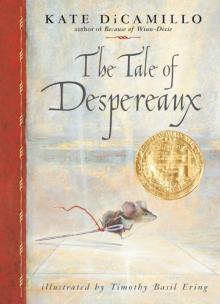 The Tale of Despereaux
The Tale of Despereaux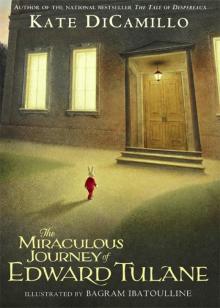 The Miraculous Journey of Edward Tulane
The Miraculous Journey of Edward Tulane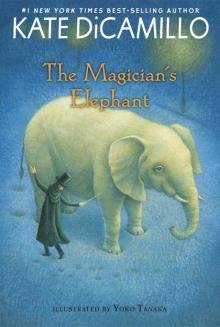 The Magician's Elephant
The Magician's Elephant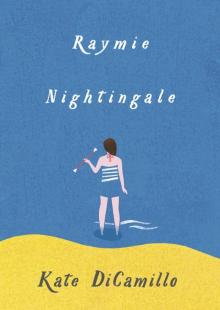 Raymie Nightingale
Raymie Nightingale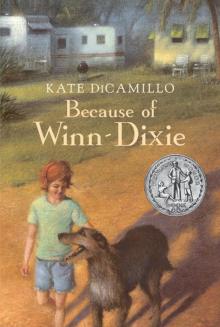 Because of Winn-Dixie
Because of Winn-Dixie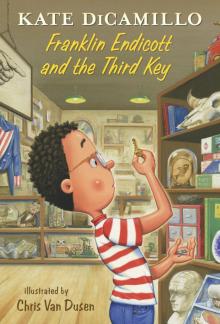 Franklin Endicott and the Third Key
Franklin Endicott and the Third Key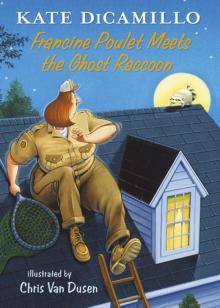 Francine Poulet Meets the Ghost Raccoon
Francine Poulet Meets the Ghost Raccoon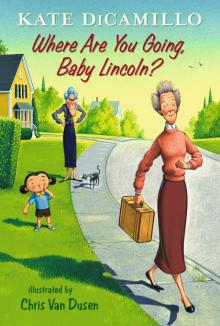 Where Are You Going, Baby Lincoln?
Where Are You Going, Baby Lincoln?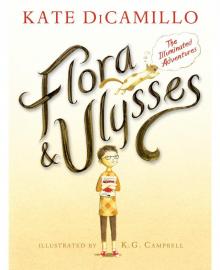 Flora & Ulysses: The Illuminated Adventures
Flora & Ulysses: The Illuminated Adventures Beverly, Right Here
Beverly, Right Here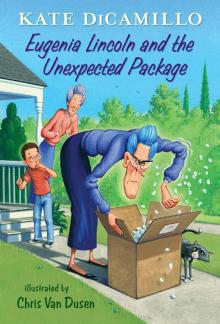 Eugenia Lincoln and the Unexpected Package
Eugenia Lincoln and the Unexpected Package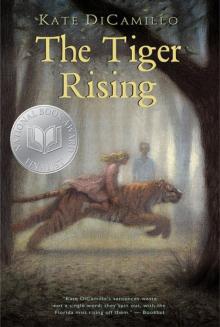 The Tiger Rising
The Tiger Rising The Beatryce Prophecy
The Beatryce Prophecy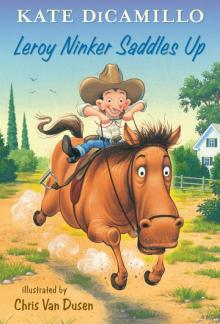 Leroy Ninker Saddles Up
Leroy Ninker Saddles Up